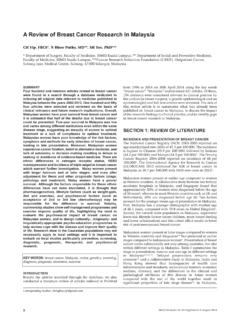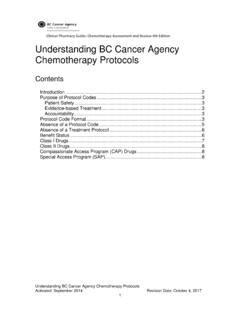Transcription of Research Paper HER2 as a Prognostic Marker in …
1 Journal of cancer 2012, 3 137 JJoouurrnnaall ooff CCaanncceerr 2012; 3: 137-144. doi: Research Paper HER2 as a Prognostic Marker in Gastric cancer - A Systematic Analysis of Data from the Literature Jan Tr st J rgensen1 , Maria Hersom2 1. Dx-Rx Institute, Baunevaenget 76, DK-3480 Fredensborg, Denmark; 2. Human Biology, Faculty of Health Sciences, University of Copenhagen, DK-2200 Copenhagen, Denmark. Corresponding author: Dx-Rx Institute, Baunevaenget 76, DK-3480 Fredensborg, Denmark, Phone: +45 4074 7846, Fax: +45 8870 8090, E-mail: Ivyspring International Publisher. This is an open-access article distributed under the terms of the Creative Commons License ( licenses/by-nc- ).
2 Reproduction is permitted for personal, noncommercial use, provided that the article is in whole, unmodified, and properly cited. Received: ; Accepted: ; Published: Abstract Through the recent conduct of the ToGA trial, HER2 has shown to be predictive for the treatment with trastuzumab in advanced gastric and gastro-oesophageal cancer . When it comes to the Prognostic properties the situation is different. Despite the fact that it is more than 20 years ago since the first studies demonstrating an association between a positive HER2 status and poor prognosis were published the issue is still controversial. In this current systematic review a large number of studies on HER2 and gastric cancer have been reviewed.
3 The studies included in this review should fulfill the following two criteria. First criterion: The number of patients in each study should be 100, and the HER2 status should have been determined either by immunohistochemistry (IHC) or in situ hybridization (ISH). Second criterion: The selected articles should include an analysis of the association between the HER2 status and survival or relevant clinicopathological characteristics. Forty-two publications with a total of 12,749 patients fulfilled the two criteria and were reviewed in detail. The majority of the publications (71%) showed that a HER2-postive status measured either by IHC or ISH was associated with poor survival and/or clinicopathological characteristics, such as serosal inva-sion, lymph node metastases, disease stage, or distant metastases.
4 Based on the current analysis a clear trend towards a potential role for HER2 as a negative prognostics factor in gastric cancer was shown, suggesting that HER2 overexpression and/or amplification is a molecular abnormality that might be linked to the development of gastric cancer . Key words: HER2, gastric cancer , Prognostic Marker , IHC, FISH, CISH. Introduction HER2 has shown to possess predictive proper-ties for the treatment with the monoclonal antibody trastuzumab (Herceptin, Roche/Genentech) in breast cancer , and the recent ToGA trial has shown similar characteristic in gastric cancer [1-3]. However, when it comes to the Prognostic properties of the HER2 status there seems to be differences in how the Marker is perceived in the two diseases.
5 For breast cancer HER2 was found to be a negative Prognostic factor very early on [4], but for gastric cancer there still seems to be no consensus, despite the fact that the first studies demonstrating an association between a positive HER2 status and poor prognosis appeared already 20 years ago [5, 6]. The gene for the HER2 protein (also known as ErbB-2, c-erbB2 or Her2/neu) is a proto-oncogene located on the chromosome 17. The HER2 gene en-codes a 185-kDa transmembrane tyrosine kinase re-ceptor protein, which is a member of the HER-family (HER1-4) [1, 7]. HER2 amplification and overexpres-sion have been found to promote tumorigenesis and to be involved in pathogenesis of several human Ivyspring International Publisher Journal of cancer 2012, 3 138 cancers [1, 3].
6 Slamon et al. demonstrated that ampli-fication of the HER2 gene in patients with breast can-cer negatively impacted the recurrence of the disease and the survival [4]. For both gene amplification and overexpression of the protein similar results have subsequently been shown in a large number of stud-ies. A recent meta-analysis, based on data from 39,730 patients, has further confirmed the Prognostic prop-erties of a positive HER2 status in women with breast cancer [1]. For gastric or gastro-oesophageal junction cancer the Prognostic significance of the HER2 status seems less clear and it has recently been discussed in relation to the publication of the results from the ToGA trial [2].
7 In this study the patients with HER2 positive dis-ease were randomized to receive chemotherapy (capecitabine (Xeloda, Roche) plus cispaltin or fluor-ouracil plus cisplatin) or chemotherapy plus trastuzumab. The primary analysis of the study showed a median overall survival (OS) of month for the group of patients that received the combined treatment of chemotherapy and trastuzumab com-pared to month for the group that was assigned to chemotherapy alone. In the discussion section of the Paper recently published in the Lancet it was mentioned that the OS of month in the group of patients receiving chemotherapy alone was longer than expected.
8 As a possible explanation for this it was stated that HER2 overexpression might already be conferring a better prognosis across the groups of patients studied. However, it was also mentioned that HER2 overexpression leading to a better prognosis is in contrast to recent studies that have showed an as-sociation between HER2-positive tumors and poor outcome and aggressive disease. The authors further concluded that more studies are needed to address the issue of whether HER2 has an effect on prognosis in gastric cancer , and whether it confers a good or poor prognosis [2]. For more than 20 years a relatively large number of studies on HER2 in gastric cancer have been pub-lished, and many of these have looked at the associa-tion between a HER2-postive status and survival and/or important clinicopathological characteristics.
9 In this current systematic review we have utilized the already existing literature to address the issue on the Prognostic properties of a HER2-postive status in gastric cancer . Methods A PubMed search was undertaken to identify articles in English, from 1986 to August 2011, using the key word gastric cancer combined with HER2 , ErbB-2 , c-erbB2 , and Her2/neu . Ad-ditional articles were found by a manual search for references from the already identified articles. The articles were included in the analysis, if they fulfilled the following two criteria. Criterion 1: The number of patients studied should be 100 and the HER2 status should have been determined by immunohistochem-istry (IHC) or in situ hybridization (ISH) such as flu-orescence in situ hybridization (FISH) or chromogenic in situ hybridization (CISH).
10 Criterion 2: The selected articles should include an analysis of the association between the HER2 status and survival, OS and/or disease-free survival (DFS) and/or relevant clinico-pathological characteristics such as serosal invasion, vascular invasion, lymph node involvement, distant metastases, disease stage, etc. Examples of the stain-ing methods related to Criterion 1 are shown in Figure 1. The identified articles were scored according to the strength of the association between the positive HER2 status and the Prognostic information reported, using a three point categorical scale. If a statistic sig-nificant association between the HER2-positive status and survival was reported, the studies were marked with two pluses (++) indicating the strongest associa-tion.











